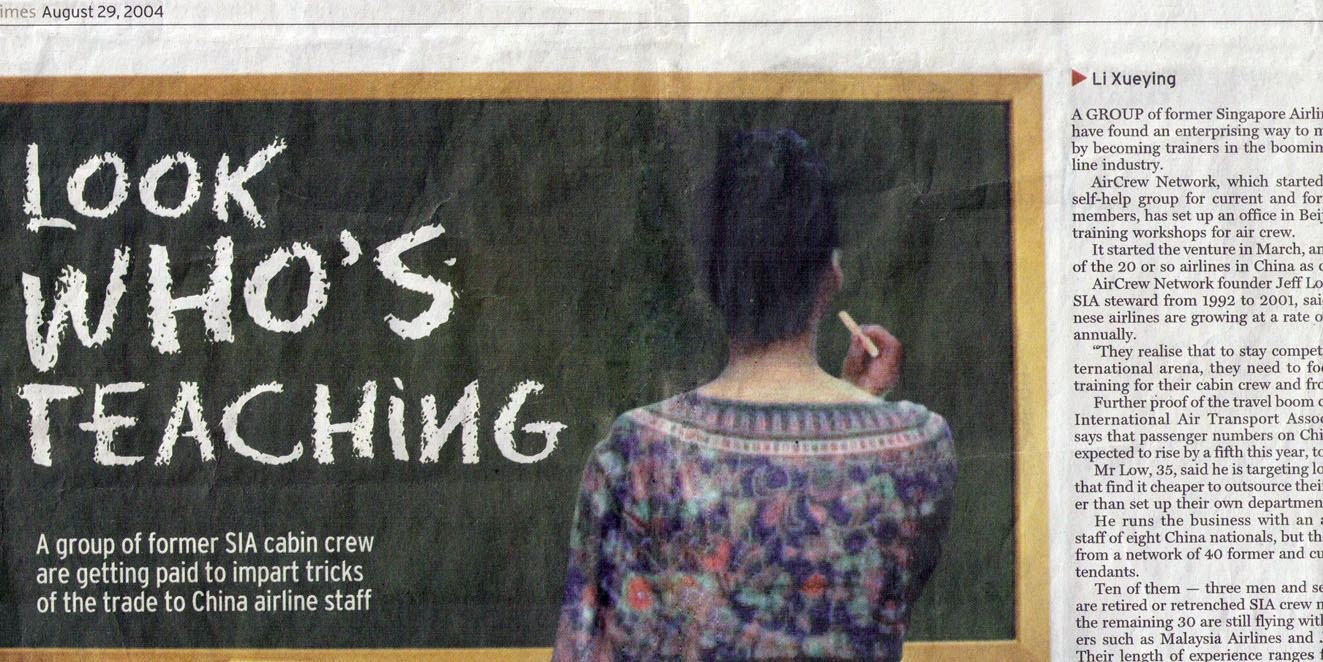LOOK WHO’S TEACHING

A group of former SIA cabin crew are getting paid to impart tricks of the trade to China airline staff
“They have a wealth of experience which you will not find in textbooks.”——MR JEEF LOW, AirCrew Netwok founder and a former SIA air steward A GROUP of former Singapore Airlines cabin crew have found an enterprising way to make money — by becoming trainers in the booming Chinese airline industry.
AirCrew Network,which started in 1999 as a self-help group for current and former SIA crew members ,has set up an office in Beijing to provide training workshops for air crew.
It started the venture in March,and now has two of the 20 or so airlines in china as clients.
AirCrew Network founder Jeff Low, who was an SIA steward from 1992 to 2001, said:”These Chinese airlines are growing at a rate of double digits annually”.
“They realise that to stay competitive in the international arena, they need to focus on service training for their cabin crew and frontline staff.”
Further proof of the travel boom comes from the International Air Transport Association, which says that passenger numbers on China’s routes are expected to rise by a fifth this year, to 103.8 million.
Mr Low, 35, said he is targeting low-cost airlines that find it cheaper to outsource their training rather than set up their own department.
He runs the business with an administrative staff of eight China nationals, but the cachet comes from a network of 40 former and current flight at-tendants.
Ten of them — three men and seven women —are retired or retrenched SIA crew members, while the remaining 30 are still flying with various carriers such as Malaysia Airlines and Japan Airlines. Their length of experience ranges from five to 35 years.
“They have a wealth of experience which you will not find in textbooks,” said Mr Low, who dropped out of Ngee Ann Polytechnic to join SIA. He flies the instructors to Beijing as and when they are needed for the courses.
For instance, the more senior crew conduct workshops on handling unruly passengers and emergencies such as when passengers faint or when the plane is hijacked.
They might also train China air crew to deal with cultural differences between passengers of various nationalities. Swimming Pools are also rented to teach lifesaving techniques.
The junior ones share their experiences as flight attendants.
They are paid from $300 for a one-day work-shop to $2,000 for a four-day course.
One of them,a 35-year-old former SIA steward who did not want to be named, gets $500 for every four-hour workshop on how to converse with passengers.He runs a trading company, and schedules the training to coincide with his business trips in China.
“Many of these Chinese crew have a phobia of foreign passengers beacause they cant’t really speak English,” he said.” So I teach them basic English, and how to use body language to communicate.”
For their clients, the instructors’ experience and the SIA brand name are a huge draw.
Said the chief executive officer of a Chinese domestic airline:”The level of inflight service in China is low, and Jeff’s people are very experience. They can help us raise our service standard to international levels.”
Today, AirCrew Network is already seeing a six-figure monthly turnover. Its fees are not cheap—a two- day preparatory workshop for aspiring flight attendants costs US$300 (S$516) a student.
It also has fingers in other pies. It keeps its 10,000 members from more than 30 airlines informed about everything from the latest Gucci sale in Milan to the terrorism situation in Iran.
And it is organising the first-ever Miss Airline International competition in Guangdong in November , together with the 5th China International Aviation and Aerospace Exhibition.
More than 40 airlines,including Cathay pacific and Scandinavian Airlines, say they will take part. The pageant will feature three outfit changes (uniform, swimwear and evening wear ) and the women will be quizzed on their aviation knowledge.
IATAContentBox1
IATAContentBox2
IATAContentBox3
IATAContentBox4